仁爱英语八年级上英语语法
仁爱版英语八年级上册知识点归纳

仁爱版英语八年级上册知识点归纳一、Unit 11.重点词汇:festival, custom, occasion, traditional, celebrate, annual, superstition2.语法:一般现在时和现在进行时3.重点句型:How do you celebrate the Spring Festival? I usually clean the house and have a big family dinner.二、Unit 21.重点词汇:adventure, explore, wander, journey, destination, route, scenery2.语法:一般过去时和过去进行时3.重点句型:We visited the Great Wall and took many photos.三、Unit 31.重点词汇:charity, donation, organization, fund, poverty, volunteer, campaign2.语法:情态动词can, could, may, might表请求、允许、建议、批准等3.重点句型:Can I join the charity bike ride? Sure, you can.四、Unit 41.重点词汇:weather forecast, hurricane, tornado, thunderstorm, lightning, disaster, rescue2.语法:虚拟语气3.重点句型:If I were you, I would take an umbrella because it may rain this afternoon.五、Unit 51.重点词汇:talent show, contestant, judge, round, applause, champion, performance2.语法:感叹句3.重点句型:What a wonderful performance!六、Unit 61.重点词汇:hobby, furniture, instrument, recipe, exhibition, display, masterpiece2.语法:动词不定式3.重点句型:She likes to play the piano in her free time.七、Unit 71.重点词汇:environment, pollution, recycle, global warming, carbon dioxide, emissions, alternative2.语法:虚拟语气3.重点句型:If we don't take action now, the environment will bein great danger.八、Unit 81.重点词汇:vacation, destination, souvenir, guidebook, sightseeing, journey, amodation2.语法:宾语从句3.重点句型:I want to know where you are going for vacation.以上是仁爱版英语八年级上册的知识点归纳。
初中英语八上仁爱版语法知识点总结

1.during 在。
期间during the daytime 在白天during the days 在这几天期间I was at school during these days .against 对着,反对(prep)for 支持,为了.......fight against .....反对....而战fight for .....为了....而战We’re going to have a basketball game against Class Three on Sunday . 我们将要在星期天举行一场和3班对打的篮球赛win vt.赢得.... 获胜win +比赛、球赛、奖品等等win the football match 打赢这场足球赛Win the first 赢得第一win the first prize 赢得一等奖I hope our team will win .我希望我们对获胜。
Cheer up !振作起来Cheer sb. On 为....加油Would you come and cheer us on ?Practice +sth./ doing sth.Please practice speaking English every day . 请每天锻炼说英语Prefer vt. 更喜欢,宁愿prefer doing sth. 更喜欢做某事prefer to do sth . 宁愿做某事Which sport do you prefer , swimming or rowing ?I prefer swimming .Prefer A to B 比起B 更喜欢A I prefer Chinese to English .prefer doing A to doing B 比起B更喜欢AI prefer watching TV to doing homework .dream n. 梦想梦What’s your dream ? My dream is to be an actor .My dream will come true in the future .在以后我将会实现我的梦想。
(完整版)仁爱版八年级上册英语知识点总结

八年级上英语语法1) leave 的用法1.“leave+地址”表示“走开某地”。
比如:When did you leave Shanghai?你什么时候走开上海的?2.“leave for+地址”表示“起程去某地”。
比如:Next Friday, Alice is leaving for London.下周五,爱丽斯要去伦敦了。
3.“leave+地址 +for+ 地址”表示“走开某地去某地”。
比如:Why are you leaving Shanghai for Beijing?你为何要走开上海去北京?2)神态动词 should“应当”学会使用should 作为神态动词用,常常表表示外、诧异、不可以理解等,有“竟会”的意思,比如:How should I know? 我怎么知道?Why should you be so late today? 你今日为何来得这么晚?should 有时表示应当成或发生的事,比如:We should help each other我.们应当相互帮助。
我们在使用时要注意以下几点:1.用于表示“应当”或“不该当”的观点。
此常常指尊长教育或责怪晚辈。
比如:You should be here with clean hands.你应当把手洗洁净了再来。
2.用于提出建议开导他人。
比如:You should go to the doctor if you feel ill. 假如你感觉不舒畅,你最好去看医生。
3. 用于表示可能性。
should 的这一用法是考试中常常出现的考点之一。
例如:We should arrive by supper time. 我们在晚餐前就能到了。
She should be here any moment.她随时都可能来。
31. what 与 which 都是疑问代词,都能够指人或事物,但是 what 仅用来咨询职业。
如:What is your father?你父亲是干什么的?该句相当于:What does your father do?What is your father's job?Which 指代的是特定范围内的某一个人。
仁爱版英语八年级上知识点归纳

仁爱版英语八年级上知识点归纳八年级上册的英语教材是中学生英语学习的重要阶段,学习内容涵盖了语法、词汇、听说读写等各个方面的知识。
下面将对仁爱版英语八年级上册的知识点进行归纳和总结,以帮助同学们更好地学习和复习。
一、语法知识点1. 一般现在时:描述经常性的动作或现实情况。
例如:I usually go to school by bus.2. 一般过去时:描述过去某个时间发生的动作或存在的状况。
例如:He played football yesterday.3. 现在进行时:表示现阶段正在进行的动作。
例如:She is watching TV now.4. 一般将来时:表示将来某个时间或某个动作会发生。
例如:I will go to the park tomorrow.5. 情态动词can:表示能力、许可和请求等。
例如:I can play the piano.6. 情态动词should:表示建议、责任和必要等。
例如:You should listen to your parents.7. 动词不定式:表示目的、愿望和计划等。
例如:I want to be a teacher.8. 动词的-ing形式:作主语、宾语、表语和状语等。
例如:Swimming is my favorite sport.二、词汇知识点1. 数字:zero, one, two, three, four, five, six, seven, eight, nine, ten等。
2. 颜色:red, blue, green, yellow, black, white, pink等。
3. 学科:math, English, Chinese, history, geography, PE等。
4. 动物:dog, cat, bird, fish, tiger, panda, monkey, elephant等。
5. 食物:noodles, rice, bread, milk, juice, apple, banana等。
最新仁爱版英语八年级上册语法汇总
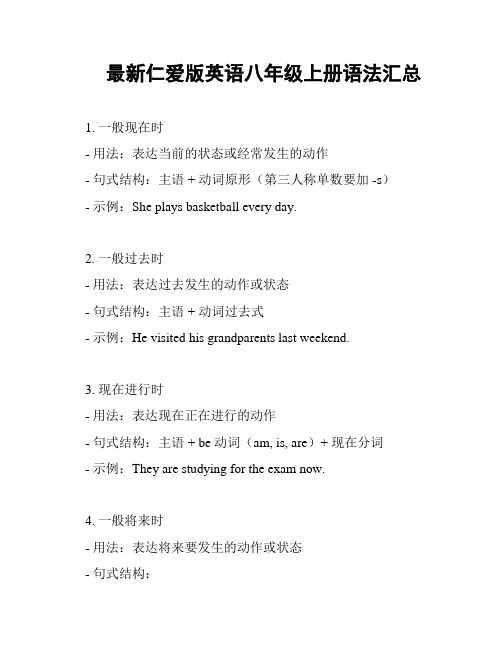
最新仁爱版英语八年级上册语法汇总
1. 一般现在时
- 用法:表达当前的状态或经常发生的动作
- 句式结构:主语 + 动词原形(第三人称单数要加 -s)
- 示例:She plays basketball every day.
2. 一般过去时
- 用法:表达过去发生的动作或状态
- 句式结构:主语 + 动词过去式
- 示例:He visited his grandparents last weekend.
3. 现在进行时
- 用法:表达现在正在进行的动作
- 句式结构:主语 + be 动词(am, is, are)+ 现在分词
- 示例:They are studying for the exam now.
4. 一般将来时
- 用法:表达将来要发生的动作或状态
- 句式结构:
- 主语 + will + 动词原形(肯定句)
- 主语 + won't + 动词原形(否定句)
- Will + 主语 + 动词原形?(疑问句)
- 示例:I will finish my homework later.
5. 现在完成时
- 用法:表达过去发生的但与现在相关的动作或状态
- 句式结构:主语 + have/has + 过去分词
- 示例:She has already eaten lunch.
以上是最新仁爱版英语八年级上册的语法汇总。
语法知识的掌握对于学习英语非常重要,希望以上内容能帮助你更好地理解和应用语法规则。
如果有任何疑问,请随时向我提问。
英语八年级上册语法知识点仁爱版

英语八年级上册语法知识点仁爱版一、一般现在时1. 概念:表示经常发生的动作或存在的状态。
2. 构成:动词原形或第三人称单数形式。
3. 用法:表示经常性、习惯性的动作或存在的状态,也表示现在的特征或状态。
如:He often helps his mother do the housework. 他经常帮他妈妈做家务。
4. 特殊用法:表示主语具备的性格和能力,也可以表示客观事实或普遍真理。
如:She can sing this song in English. 她能用英语唱这首歌。
二、现在进行时1. 概念:表示正在进行的动作或存在的状态。
2. 构成:be动词(am/is/are)+动词的现在分词形式(-ing)。
3. 用法:表示正在进行的动作或存在的状态,强调的是正在发生的事情。
如:They are studying in the classroom. 他们在教室里学习。
4. 特殊用法:表示将来发生的动作,也可以表示过去发生的动作。
如:He is coming to see you tomorrow. 他明天要来看你。
(表示将来) They were having a meeting at this time yesterday. 昨天这个时候他们在开会。
(表示过去)三、现在完成时1. 概念:表示已经完成的动作或存在的状态,对现在产生的影响或结果。
2. 构成:have/has + 过去分词。
3. 用法:表示过去发生的动作已经完成,对现在产生的影响或结果。
如:I have finished my homework. 我已经完成了我的作业。
4. 特殊用法:可以表示发生在过去的动作延续到现在,也可以表示过去发生的动作与现在的状态有关。
如:He has lived here since 2000. 他从2000年就住在这里了。
(表示过去的动作延续到现在)They have been married for five years. 他们结婚已经五年了。
仁爱版八年级上册英语语法整理

仁爱版八年级上册英语语法整理本文档旨在整理仁爱版八年级上册英语语法知识,提供给学生作为参考。
以下为语法要点:1. 时态- 一般现在时:表示经常性的动作或现有状态。
- 结构:主语 + 动词原形 (+ 补语)- 例句:I play soccer every afternoon.- 现在进行时:表示正在进行的动作。
- 结构:主语 + be 动词 (am/is/are) + 动词 -ing (+ 补语)- 例句:She is studying for her exam.- 一般将来时:表示将来要发生的动作或存在的状态。
- 结构:主语 + will + 动词原形 (+ 补语)- 例句:We will visit the museum tomorrow.2. 名词- 可数名词:表示可以数的名词,有单数和复数形式。
- 例词:book, dog, apple- 单数:a book, this dog, an apple- 复数:two books, those dogs, some apples- 不可数名词:表示不可数的名词,只有单数形式。
- 例词:water, milk, information- 用法:不加冠词直接使用,或加上量词表达具体数量。
3. 形容词- 形容词的比较级和最高级:用于比较两个或多个事物的特征。
- 比较级:加 -er 或在前面加 more- 例句:That car is faster than mine. / That car is more expensive than mine.- 最高级:加 -est 或在前面加 most- 例句:She is the tallest girl in the class. / She is the most intelligent student.4. 副词- 副词修饰动词、形容词或其他副词,表示时间、地点、程度等。
- 常见副词:quickly, quietly, often, always- 例句:He speaks English fluently. / We usually go shopping on weekends.以上是仁爱版八年级上册英语语法的主要内容。
仁爱版英语八年级(上册)各单元重点短语、句型、语法汇总

仁爱版八年级上册各单元重点短语句型语法汇总Unit1 Playing Sports I’m going to play basketball.Topic1 【重点单词】 )health 名词)fit(同义词1. healthy( )winner 名词)won(过去式2. win( )skiing 现在分词3. ski( )more famous 比较级4. famous( )reach 同义词5. arrive(6. leave( ))left 过去式 )most popular 最高级7. popular( 【重点短语】在暑假期间during the summer holidays1. between…and…在两者之间2. 为某人加油cheer sb. on3. 更喜欢做某事prefer doing sth.4. 很多quite a bit/a lot5. 计划做某事plan to do sth.6. 举办滑雪俱乐部have a skating club7. 滑冰/去滑雪go skating/skiing/bicycling/climbing/hiking8. /爬山/骑车/ 远足到达arrive in/at9. 较量/play against…与……对抗10. 很久for long11. leave for…动身去…12. 后天the day after tomorrow13. 中国国家队China’s national team14. 打棒球play baseball15. 至少at least16. 多羞愧!What a shame! 17. 18. 善于做某事be good at 参加take part in19. 全世界all over the world20. 对……有益be good for21.一种好方法a good way22. 保持健康keep fit/healthy23. 放松某人自己relax oneself24. 【重点句型】What’s your favorite sport? = What sport do you like best? 你最1. ? 喜爱的运动是什么你更Which sport do you prefer? = Which sport do you like better?2. ? 喜欢什么运动 . 我更喜欢滑雪I prefer skating.= I like skating better. Do you skate much? = Do you often skate?3. ? 你常滑雪吗每天她至少She spends at least half an hour in the gym every day.4. . 花半小时在体育馆 She plays baseball pretty well and she is also good at5. . 她棒球打得相当好而且擅长于跳jumping. 你喜What kind of sports do you like? = Which sport do you like?6. ? 欢哪种运动你愿意来为我们加油吗?Would you like to come and cheer us on?7. 当你长大后做什么?What are you going to be when you grow up?8. 下月有一场运There is going to be a school sports meet next month.9. 动会。
仁爱版英语八年级上册八上必背动词短语汇总(含语法)

仁爱版英语八年级上册八上必背动词短语汇总(含语法)仁爱版英语八年级上册八上必背动词短语汇总(含语法)表达喜好和意愿- Would like to (do something):愿意(做某事)- Prefer (to do something):更喜欢(做某事)- Enjoy (doing something):喜欢(做某事)- Love (doing something):爱(做某事)- Hate (doing something):讨厌(做某事)- Want (to do something):想要(做某事)- Hope (to do something):希望(做某事)表达能力- Be able to (do something):能够(做某事)- Can (do something):能够(做某事)- Could (do something):可以(做某事)- Know how to (do something):知道如何(做某事)- Have the ability to (do something):有能力(做某事)表达喜欢和不喜欢的程度- Really enjoy (doing something):非常喜欢(做某事)- Absolutely love (doing something):非常喜爱(做某事)- Quite like (doing something):相当喜欢(做某事)- Don't mind (doing something):不介意(做某事)- Dislike (doing something):不喜欢(做某事)- Really hate (doing something):非常讨厌(做某事)表达惯和经验- Used to (do something):过去常常(做某事)- Be used to (doing something):惯(做某事)- Get used to (doing something):逐渐惯(做某事)- Have experience in (doing something):有经验(做某事)- Be good at (doing something):擅长(做某事)表达意图和目的- Intend (to do something):打算(做某事)- Plan (to do something):计划(做某事)- Aim (to do something):打算(做某事)- Purpose (to do something):目的(做某事)表达允诺和建议- Promise (to do something):承诺(做某事)- Agree (to do something):同意(做某事)- Suggest (doing something):建议(做某事)- Advise (doing something):劝告(做某事)表达兴趣和态度- Be interested in (doing something):对(做某事)感兴趣- Be excited about (doing something):对(做某事)感到兴奋- Be worried about (doing something):对(做某事)感到担忧- Be surprised at (doing something):对(做某事)感到惊讶表达情感和感受- Feel like (doing something):有想要(做某事)的感觉- Look forward to (doing something):期待(做某事)- Be happy about (doing something):为(做某事)感到高兴- Be sad about (doing something):为(做某事)感到伤心以上是仁爱版英语八年级上册八上必背动词短语汇总的内容。
八年级上仁爱版英语重点句子和语法

1.Should建议某人做某事.情态动词用来提建议;表示应该的意思.后接动词原形Should+动词原形…..2.take/havearest翻译为:好好休息息.take/have可以互换.3.Shouldn’t=Shouldnot不应该4.see/watch/hear为感官动词.A..后接sb.dosth.表示看/听到某人在做某事.①表示经常性地或者是习惯性的动作.②看到或听到的这个动作的整个过程.B.后接sb.doingsth.表示看/听到某人正在做某事.一般是指看到/听到这个动作正在进行.do/doing用来宾语补足语.5.cherrsb.on当中sb.用人名或者是人称代词的宾格形式代替.翻译为:为某人加油喝彩.6.begoingto结构:用来表示:将来的计划或者是打算.翻译为:打算去做某事;计划去做某事.肯定句:主语+beam/is/are+goingto+动词原形…..否定句:主语+beam/is/are+not+goingto+动词原形…..疑问句:beis/are+主语+goingto+动词原形…..特殊疑问句:疑问词+be+主语+goingto…7.prefer+名词/动名词/代词/宾语从句/不定式8.join=becomeamember翻译为加入.表示加入某个组织或者团体.9.playfor效力于….10.arrive+in+大地方/arrive+at+小地方同义的是:getto/reach翻译为:到达某地12.makesb./sth.+形容词使某/人某物怎么样13.begoodfor对…..有益bebadfor对…..有害14.keepsth./sb.+形容词使某人/某物保持某一种状态15.主语+spend+时间+onsth./indoingsth.某人花了时间/金钱做某事16.pretty=very或者quite翻译为:很;非常17.Therebe句型的一般将来时:翻译为某地将要发生某事①There+begoingto+be……begoingto句型②There+will+be……will句型;没有人称和数的变化18.besure+that从句/todosth.翻译为:确信19.dosb.afavor/helpsb./givesb.ahand经常用来表示寻求帮助20.oneof+名词复数形式/代词的宾格翻译为:…..中之一如果oneof做主语;谓语动词用第三人称单数21.Wouldyoumind+doingstn. 做…..你介意吗Wouldyoumind+not+doingstn.做……你不介意吗英语中;表示委婉请求的表达方式回答:①接受:1.notatall没问题2.ofcoursenot没问题②拒绝:1.I’msorry;I’mafraidyou’dbetternot对不起;恐怕你不能这样做22.need+todosth.翻译为:需要做某事23.keepdoingsth.翻译为:继续做某事24.losethegame输了这场比赛25.beangrywithsb.翻译为:生某人的气with为介词;sb.接人称代词的宾格形式26.haveafight争吵;打架fight做名词讲27.saysorrytosb.翻译为:向某人道歉sb.接名词/人称代词的宾格形式28.withone’shelp/withthehelpofsb.翻译为:在某人的帮助下29.keepsb.doingsth.翻译为:使某人一直做某事30.will句型的一般将来时:will没有人称和数的变化;适用于任何人称①肯定句型:主语+will+动词原形翻译为:计划;打算去做某事②否定句型:主语+will+not+动词原形翻译为:不打算;不计划去做某事③疑问句型:Will+主语+动词原形… 翻译为:打算;计划去做某事吗回答:1.肯定回答Yes;主语+will2.否定回答:No;主语+won’t/willnot.31.belatefor来晚了;迟到32.besorryfor+sth./doingsth.翻译为:为……而感到抱歉33.beimportanttosb.翻译为:对某人说是重要的34.quite+abit/alot表示频率后接of用来修饰名词35.enjoydoingsth.喜欢做某事36.start/begin+todosth./doingsth.翻译为:开始做某事37.also用于句中用于肯定句Either用于句末一般用于否定句Too用于句末一般用于肯定句aswell用于句末一般用于肯定句全部都表示”也”的意思38.get动词;gettiredeasily中做系动词;后接tired形容词做表语.39.buildsb.up翻译为:增强某人的……sb.接人称代词的宾格形式和名词40.havefundoingsth.从……中得到乐趣41.havefun/haveagoodtime/enjoyoneself翻译为:玩得愉快;开心42.havefundoingsth./enjoydoingsth.翻译为:乐于做某事43.fillout=fillin填写fillsb.out填写……sb.为名词/人称代词的宾格形式44.bewith和……相处;和……在一起45.befriendlytosb.翻译为:对某人友好46.makefriendswithsb.翻译为:和某人交朋友47.prefer…to..翻译为:比起……来;更喜欢……48.maybe是副词;表示大概;也许或者可能的意思在句子中做状语maybemay是情态动词;加上be翻译为:可能是;大概是在句子中做谓语49.howabout/whatabout+名词/动名词翻译为:……怎么样50.befree反义bebusy翻译为:空闲的繁忙的51.every+基数词+复数名词翻译为:”每……”52.befondof+名词/动名词=like+动名词/名词翻译为:喜欢;乐意做某事。
仁爱版英语八年级上册短语+句子+语法
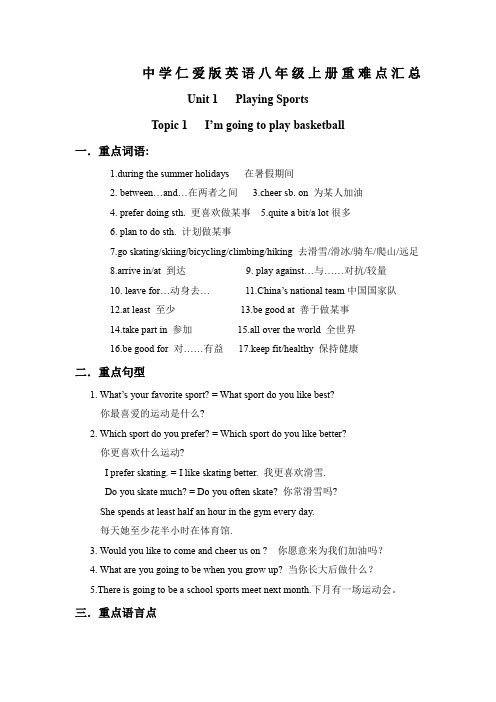
中学仁爱版英语八年级上册重难点汇总Unit 1 Playing SportsTopic 1 I’m going to play basketball一.重点词语:1.during the summer holidays 在暑假期间2. between…and…在两者之间3.cheer sb. on 为某人加油4. prefer doing sth. 更喜欢做某事5.quite a bit/a lot很多6. plan to do sth. 计划做某事7.go skating/skiing/bicycling/climbing/hiking 去滑雪/滑冰/骑车/爬山/远足8.arrive in/at 到达9. play against…与……对抗/较量10. leave for…动身去…11.China’s national team中国国家队12.at least 至少13.be good at 善于做某事14.take part in 参加15.all over the world 全世界16.be good for 对……有益17.keep fit/healthy 保持健康二.重点句型1. What’s your favorite sport? = What sport do you like best?你最喜爱的运动是什么?2. Which sport do you prefer? = Which sport do you like better?你更喜欢什么运动?I prefer skating. = I like skating better. 我更喜欢滑雪.Do you skate much? = Do you often skate? 你常滑雪吗?She spends at least half an hour in the gym every day.每天她至少花半小时在体育馆.3. Would you like to come and cheer us on ? 你愿意来为我们加油吗?4. What are you going to be when you grow up? 当你长大后做什么?5.There is going to be a school sports meet next month.下月有一场运动会。
仁爱版英语八年级上册语法知识汇总
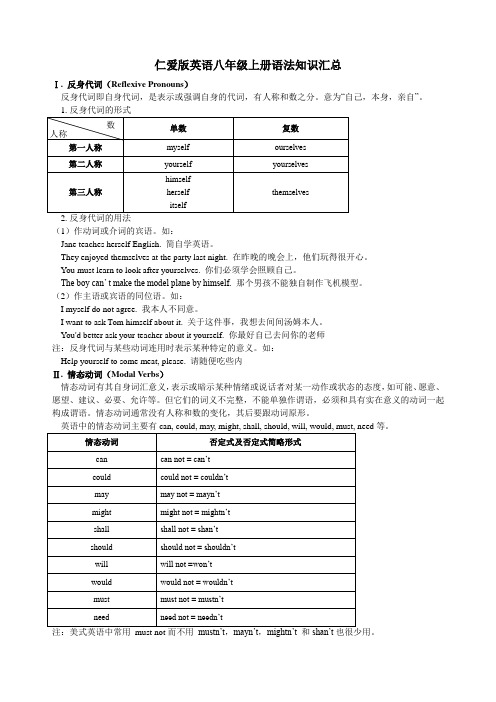
仁爱版英语八年级上册语法知识汇总Ⅰ. 反身代词(Reflexive Pronouns)反身代词即自身代词,是表示或强调自身的代词,有人称和数之分。
意为“自己,本身,亲自”。
2.反身代词的用法(1)作动词或介词的宾语。
如:Jane teaches herself English. 简自学英语。
They enjoyed themselves at the party last night. 在昨晚的晚会上,他们玩得很开心。
You must learn to look after yourselves. 你们必须学会照顾自己。
The boy can’ t make the model plane by himself. 那个男孩不能独自制作飞机模型。
(2)作主语或宾语的同位语。
如:I myself do not agree. 我本人不同意。
I want to ask Tom himself about it. 关于这件事,我想去间间汤姆本人。
You'd better ask your teacher about it yourself. 你最好自已去问你的老师注:反身代词与某些动词连用时表示某种特定的意义。
如:Help yourself to some meat, please. 请随便吃些内Ⅱ. 情态动词(Modal Verbs)情态动词有其自身词汇意义,表示或暗示某种情绪或说话者对某一动作或状态的态度,如可能、愿意、愿望、建议、必要、允许等。
但它们的词义不完整,不能单独作谓语,必须和具有实在意义的动词一起构成谓语。
情态动词通常没有人称和数的变化,其后要跟动词原形。
英语中的情态动词主要有can, could, may, might, shall, should, will, would, must, need等。
注:美式英语中常用must not而不用mustn’t,mayn’t,mightn’t 和shan’t也很少用。
仁爱英语八年级上册语法
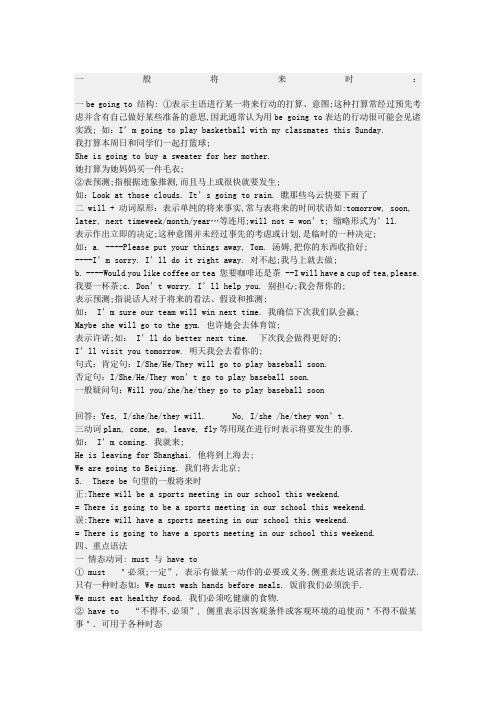
一般将来时:一be going to 结构: ①表示主语进行某一将来行动的打算、意图;这种打算常经过预先考虑并含有自己做好某些准备的意思,因此通常认为用be going to表达的行动很可能会见诸实践; 如:I’m going to play basketball with my classmates this Sunday.我打算本周日和同学们一起打篮球;She is going to buy a sweater for her mother.她打算为她妈妈买一件毛衣;②表预测;指根据迹象推测,而且马上或很快就要发生;如:Look at those clouds. It’s going to rain. 瞧那些乌云快要下雨了二 will + 动词原形:表示单纯的将来事实,常与表将来的时间状语如:tomorrow, soon, later, next timeweek/month/year…等连用;will not = won’t; 缩略形式为’ll.表示作出立即的决定;这种意图并未经过事先的考虑或计划,是临时的一种决定;如:a. ----Please put your things away, Tom. 汤姆,把你的东西收拾好;----I’m sorry. I’ll do it right away. 对不起;我马上就去做;b. ----Would you like coffee or tea 您要咖啡还是茶 --I will have a cup of tea,please. 我要一杯茶;c. Don’t worry. I’ll help you. 别担心;我会帮你的;表示预测;指说话人对于将来的看法、假设和推测;如:I’m sure our team w ill win next time. 我确信下次我们队会赢;Maybe she will go to the gym. 也许她会去体育馆;表示许诺;如:I’ll do better next time. 下次我会做得更好的;I’ll visit you tomorrow. 明天我会去看你的;句式:肯定句:I/She/He/They will go to play baseball soon.否定句:I/She/He/They won’t go to play baseball soon.一般疑问句:Will you/she/he/they go to play baseball soon回答:Yes, I/she/he/they will. No, I/she /he/they won’t.三动词plan, come, go, leave, fly等用现在进行时表示将要发生的事.如:I’m coming. 我就来;He is leaving for Shanghai. 他将到上海去;We are going to Beijing. 我们将去北京;5. There be 句型的一般将来时正:There will be a sports meeting in our school this weekend.= There is going to be a sports meeting in our school this weekend.误:There will have a sports meeting in our school this weekend.= There is going to have a sports meeting in our school this weekend.四、重点语法一情态动词: must 与 have to① must "必须;一定”, 表示有做某一动作的必要或义务,侧重表达说话者的主观看法.只有一种时态如:We must wash hands before meals. 饭前我们必须洗手.We must eat healthy food. 我们必须吃健康的食物.② have to “不得不,必须”, 侧重表示因客观条件或客观环境的迫使而"不得不做某事".可用于各种时态如:It’s t oo late. I have to go now. 太迟了.现在我得走了.I had to borrow some money at that time. 那时我不得不借了一些钱.----Must we keep the windows open all the time---No, we don’t have to. / No, we needn’t. 注意回答时不能用No, we mustn’t.1Are you free this evening = Do you have time this evening 你今天晚上有空吗三.语法学习1.I used to listen to rock music but now I collect telephone cards and paintings. Page 53我过去常听摇滚乐,可现在我集电话卡和画;used to do sth. 这一结构表示过去的习惯过去经常反复发生的动作或状态暗含的意思是现在已不复存在,只有一种形式,即过去式,用于所有人称;used to的否定形式为:used not to do或didn’t use to do;疑问句为Used you to...或 Did you use to...如:1I used to go to school on foot.我过去步行上学;暗含的意思是:我现在不再步行上学了;2Mary used to sleep late.玛莉过去总是很晚才睡觉;暗含的意思是:玛莉现在睡觉不再那么晚了;3I used to walk along the road after supper.我过去常常在晚饭后沿着这条马路散步;4He used not to like Peking opera, but now he’s very fond of it.他过去不喜欢京剧,但现在非常喜欢;现在大多数人在口语中或不太正式的书面语中对否定句和疑问句常使用与do 连用的形式;例如:1I didn’t use to like skating, but now I like it very much.我过去不喜欢滑冰,但现在很喜欢;2Did you use to go there 你以往常去哪儿3There used to be a theatre here, didn’t there 以前这里有一座剧院,是不是另外,注意be used to doing sth.与used to do sth.的区别:be used to doing sth “习惯于…,适应于…”如:1He is used to working hard. 他习惯于努力地工作;2He used to bring me roses when he came to see me. 过去他来看我时,常带玫瑰花;3I’m us ed to doing jogging in the morning now. 我习惯于早上慢跑;be used to do sth.“某物被用来做某事”;如:1Wood is used to make paper. 木材被用来生产纸张;2Computers can be used to do a lot of work now. 如今电脑可用来做许多事;2. Collecting stamps must be great fun Page 53集邮肯定很有趣must在这里是情态动词,作用是用来表示推测,可以翻译为“想必”;如:1Your brother must be in the school. I saw him just now.你的哥哥想必在学校;我刚才看见他了;2Your friend must have left for Nanjing yesterday.你的朋友想必昨天已经离开去南京了;3 She thought that her present must be in the box.她以为礼物一定是在盒子里;4 You must be thirsty after a long walk.走了很长的路,你一定渴了;5 It must be ten o’clock now.现在肯定有10点钟了;情态动词must的三种否定形式must表示“必须”时,其否定回答为don’t have to,意思为“不需要”;如:1Must I pay back the money right nowNo, you don’t have to.我必须现在偿还这笔钱吗不,你不需要现在还;2You must listen to the teacher carefully in class.你必须在课堂上认真听讲;must表示“推测”时,其否定形式为can’t,意思为“不可能”;如:1I’ve seen what she is talking about, so she can’t be telling lies.我目睹了她所说的事情,因此,她不可能在说谎;2Yesterday I received a letter from him, so he can’t be here. 昨天我收到了他的信,所以说他不可能在这儿;而must not的意思为“绝对不可,不许,禁止”;如:1You must not smoke in the hospital.你绝对不可以在医院里吸烟;2You must not cross the road when the traffic lights are red.交通灯是红色时,你千万不能过马路;3.He doesn’t mind whether they’re good or not. 他并不介意它们是否是好的;此句为以whether引导的宾语从句;whether...or not“不论是否……”;如:1You have to get up early everyday whether it rains or not.你必须天天早点起床,不论是否下雨;2Whether we go or not matters little.不论我们是否去,关系不大;if与whether的区别;二者在引导宾语从句时一般可换用;如:1I want to know if / whether it is going to rain tomorrow.我想知道明天是否下雨;2 He asked me if / whether Li Ping was at home.他问我李平是否在家;3 He didn’t understand if / whether the stranger told a lie.他不明白那个陌生人是否说的是假话; 但下列几种情况不能换用;whether 后可紧接or not,而if一般不能;Let me know whether or not you can come.你能来还是不能来,请告诉我一声;whether引导的宾语从句可移到主句前,if则不能;如:Whether this is true or not, I can not say.这件事是否真实,我说不上;不定式前用whether,不用if;如:I haven’t decided whether to go to the cinema or to stay at home.我还没有决定是看电影还是留在家里;介词后可用whether,不用if;如:I haven’t settled the question of whether I’ll go back home.我是否回家还没有定; Topic2 I like pop music三.语法学习1. What a pity Page 61真遗憾这是一个由what引导的感叹句;what引导感叹句的基本构成为:what + a / an +形容词+可数名词单数what +形容词+可数名词复数/不可数名词如:1What a stupid question多么愚蠢的问题啊2What lively boys they are 多么活泼的男孩子们啊2. What are you going to do this Sunday eveningPage61 这一周日晚上你想干什么1“be going to” 是一般将来时的一种表达方法.它表示:i 现在打算在最近或将来要做某事. 如: Tom is going to Beijing with his father next week.ii 说话人根据已有的迹象认为可能要发生某事. 如: There are a lot of dark clouds. It’s going to rain.2 “be going to”句式的基本结构:肯定句:主语+be going to … eg. He is going to stay at school.否定句:主语+be + no t +going to… eg. I’m not going to the library this afternoon.一般疑问句: Be +主语+going to… eg. Are you going to play tennis next week3be going to 用于there be 结构时要用There be going to be + 主语+其它形式.如: There is going to be a football game tomorrow.4与be going to 连用的时间状语有: next week/month/year, tomorrow, the day after tomorrow, this evening, in the future等.Topic3 The movie is so wonderful三.语法学习 I was doing some washing. I was doing some cleaning. Page 69我在洗衣服; 我在打扫卫生;这句用的是过去进行时.1. 过去进行时表示过去某一时刻正在进行或发生的动作,也表示过去一段时间内的活动或那个阶段正在进行的动作.如:He were watching TV at 8:00 last night.They were writing a book last month.1. 过去进行时由be was/were+动词ing 形式构成的,肯定句:主语+was/were +doing +…否定句: 主语+wasn’t/weren’t +doing +…一般疑问句: Was/Were+主语+doing+…肯定回答:Yes, 主语+was/were.否定回答:No, 主语+wasn’t/weren’t.如: They were studying English at this tine yesterday.They weren’t studying English at this time yesterday. Were they studying English at this time yesterdayYes, they were. / No, they weren’t.11. Then decide how you are going to spend your weekend. Page 74然后决定你的周末怎么过;spend度过;花费时间、金钱;结构有:spend...on sth., spend...indoing sth. 如:1He spent 5 yuan on the post card. 他买这张明信片花了5元钱;2They spent three days looking for the lost sheep on the hill.他们用了三天的时间在山上找丢失的羊;12. Did you have a good time Page 76 你们玩得高兴吗have a good time = enjoy oneself过得愉快;玩得高兴;类似的说法还有havea great time, have a nice time, have a wonderful time;三.语法学习 I was doing some washing. I was doing some cleaning. Page 69我在洗衣服; 我在打扫卫生;这句用的是过去进行时.1. 过去进行时表示过去某一时刻正在进行或发生的动作,也表示过去一段时间内的活动或那个阶段正在进行的动作.如:He were watching TV at 8:00 last night.They were writing a book last month.2. 过去进行时由be was/were+动词ing 形式构成的,肯定句:主语+was/were +doing +…否定句: 主语+wasn’t/weren’t +doing +…一般疑问句: Was/Were+主语+doing+…肯定回答:Yes, 主语+was/were.否定回答:No, 主语+wasn’t/weren’t.如:They were studying English at this tine yesterday. They weren’t studying English at this time yesterday. Were they studying English at this time yesterdayYes, they were. / No, they weren’t.Unit 4 Our World三.语法学习一.现在进行时与过去进行时的区别:1.现在进行时表示现在正在发生或正在做的事情,基本结构be+现在分词;如:肯定句:The robots are making a car now. 这些机器人正在生产小汽车;否定句:We are not studying on the Internet. 我们没有在互联网上学习;疑问句:Is the teacher looking up the word in the dictionary这个老师正在词典中查这个词吗特殊疑问句:Who am I talking to我在和谁谈话2.过去进行时表示过去某一时间,正在发生或正在做的事情;基本结构waswere+现在分词;肯定句:When he came in,I was writing a letter.当他进来时,我在写一封信;否定句:They weren’t watching TV while she was reading.她读书时,他们没在看电视;疑问句:Was the UFO flying to us at 8 last night昨晚8点UFO向我们飞来了吗特殊疑问句:What were you drinking while we were sleeping 我们睡觉时,你们在喝什么进行时态往往用在时间状语从句中,常与when,while等连词搭配;二.be sure结构表示肯定和不肯定;be sure一般用来表示肯定,be not surewhether/if表示不肯定;be sure后面可以跟不定式和宾语从句;跟不定式一般译为“一定……”,跟宾语从句,译为“确信……”;如:We are sure to repair the TV well. 我们一定修好这台电视机;I’m sure you can finish your work. 我确信你能完成你的工作;Are you sure whetherifhe switched the computer on你确信他打开还是没有打开电脑三. 语法学习反意疑问句:由陈述句或祈使句、感叹句加一个简短问句构成的疑问句叫反意疑问句;实质是前面陈述句的反问句;一般对应规律:前肯后否;前否后肯;即陈述部分为肯定形式,附加问句用否定形式;陈述部分为否定形式,附加问句用肯定形式;如:There are many pyrami ds in Egypt,aren’t there 在埃及有许多金字塔,不是吗Sally visited the Great Wall last month,didn’t she 萨莉上个月参观了长城,不是吗He doesn’t realize the importance of saving water,does he 他没有意识到节约用水的重要性,是吗特例点拨:①I’m your good friend,aren’t I 我是你的好朋友,不是吗 I don’t think you can rebu ild the house,can you 我认为你不能重修这座房子,是吗I don’t think…主要在说think后的内容,故按从句变化;②陈述部分有nobody,nothing,never,no,few没几个,little几乎没有,hardly 几乎不等否定或半否定词时,仍视为否定句;根据反意疑问句对应规律,疑问部分用肯定形式;如:There is nothing in the room,is there 屋子里什么也没有,是吗Maria never surports me,does she 玛丽亚从未支持过我,是吗He had few apples,did he 他几乎没有苹果,是吗③祈使句的反意疑问句:无论肯定或否定,通常在祈使句后加上will you 如:Please close the door,will you 请关门好吗Don’t tear down the old walls,will you 不要拆毁古墙,好吗但以Let’s开头的祈使句用shall we 如:let’s make a survey,shall we我们做个调查,好吗。
最新八年级英语(仁爱版)上册语法点归纳
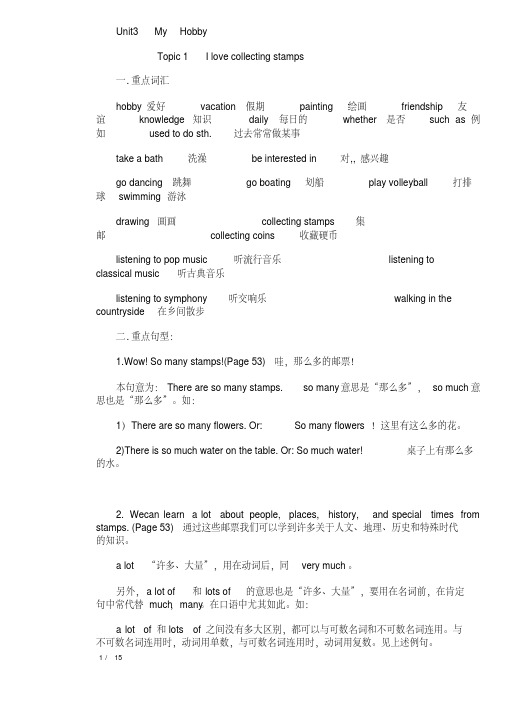
Unit3 My HobbyTopic 1 I love collecting stamps一.重点词汇hobby 爱好 vacation假期 painting 绘画 friendship友谊 knowledge 知识daily 每日的 whether 是否 such as 例如 used to do sth. 过去常常做某事take a bath 洗澡 be interested in 对,,感兴趣go dancing 跳舞 go boating 划船 play volleyball 打排球 swimming 游泳drawing 画画 collecting stamps 集邮 collecting coins 收藏硬币listening to pop music 听流行音乐 listening toclassical music 听古典音乐listening to symphony 听交响乐 walking in the countryside 在乡间散步二.重点句型:1.Wow! So many stamps!(Page 53)哇,那么多的邮票!本句意为:There are so many stamps. so many意思是“那么多”,so much意思也是“那么多”。
如:1)There are so many flowers. Or: So many flowers!这里有这么多的花。
2)There is so much water on the table. Or: So much water!桌子上有那么多的水。
2. We c an learn a lot about people, places, history, and special times from stamps. (Page 53)通过这些邮票我们可以学到许多关于人文、地理、历史和特殊时代的知识。
a lot “许多、大量”,用在动词后,同very much。
仁爱英语八年级上册语法精讲
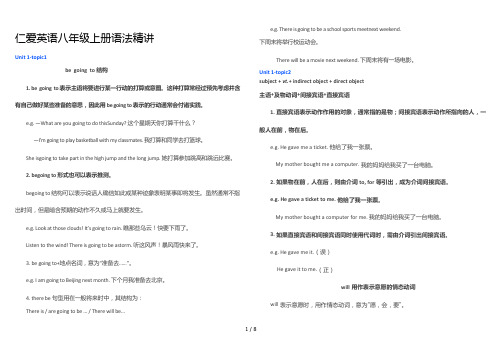
仁爱英语八年级上册语法精讲Unit 1-topic1be going to 结构1. be going to 表示主语将要进行某一行动的打算或意图。
这种打算常经过预先考虑并含有自己做好某些准备的意思,因此用be going to 表示的行动通常会付诸实践。
e.g. —What are you going to do thisSunday? 这个星期天你打算干什么?—I’m going to play basketball with my classmates. 我打算和同学去打篮球。
She isgoing to take part in the high jump and the long jump. 她打算参加跳高和跳远比赛。
2. begoing to 形式也可以表示推测。
begoing to 结构可以表示说话人确信如此或某种迹象表明某事即将发生。
虽然通常不指出时间,但是暗含预期的动作不久或马上就要发生。
e.g. Look at those clouds! It’s going to rain. 瞧那些乌云!快要下雨了。
Listen to the wind! There is going to be astorm. 听这风声!暴风雨快来了。
3. be going to+地点名词,意为“准备去……”。
e.g. I am going to Beijing next month. 下个月我准备去北京。
4. there be句型用在一般将来时中,其结构为:There is / are going to be ... / There will be...e.g. There is going to be a school sports meetnext weekend.下周末将举行校运动会。
There will be a movie next weekend. 下周末将有一场电影。
Unit 1-topic2subject + vt.+ indirect object + direct object主语+及物动词+间接宾语+直接宾语1. 直接宾语表示动作作用的对象,通常指的是物;间接宾语表示动作所指向的人,一般人在前,物在后。
- 1、下载文档前请自行甄别文档内容的完整性,平台不提供额外的编辑、内容补充、找答案等附加服务。
- 2、"仅部分预览"的文档,不可在线预览部分如存在完整性等问题,可反馈申请退款(可完整预览的文档不适用该条件!)。
- 3、如文档侵犯您的权益,请联系客服反馈,我们会尽快为您处理(人工客服工作时间:9:00-18:30)。
八年级上学期英语语法汇总一. 形容词/副词的比较级和最高级1. 形容词/副词的比较级和最高级的构成规则(1)单音节词和少数以-er,-ow结尾的双音节单词,比较级在后面加-er,最高级在后面加-est。
①单音节单词small→smaller→smallestshort→shorter→shortesttall→taller→tallestgreat→greater→greatest②少数以-er,-ow结尾的双音节单词clever→cleverer→cleverestnarrow→narrower→narrowest(2)以不发音e结尾的单音节单词,比较级在原形后加-r,最高级在原级后加-st。
large→larger→largestnice→nicer→nicestable→abler→ablest(3)以一个辅音字母结尾的闭音节(即:辅音+元音+辅音)单词中,先双写末尾的辅音字母,比较级加-er,最高级加-est。
big→bigger→biggesthot→hotter→hot testfat→fatter→fattest(4)以“辅音字母+y”结尾的双音节词,把y改为i,比较级加-er,最高级加-est。
easy→easier→easiestheavy→heavier→heaviestbusy→busier→busiesthappy→happier→happiest(5)其他双音节词和多音节词,比较级在前面加more,最高级在前面加most。
beautiful→more beautiful→most beautifuldiffe rent→more different→most differenteasily→more easily→most easily(6)有少数形容词、副词的比较级和最高级是不规则的,必须熟记。
good→better→bestwell→better→bestbad→worse→worstill→worse→worstold→older/elder→oldest/eldestmany/much→more→mostlittle→less→leastfar →further/farther→ furthest/farthest2. 形容词和副词比较级的用法(1)“甲+be+(倍数)+形容词比较级+than+乙”表示“甲比乙…”或“甲比乙…几倍”。
Tom is taller than Kate.汤姆比凯特高。
This room is three times bigger than that one.这个房间比那个大三倍。
(2)“甲+实意动词+(倍数)+副词比较级+than+乙”表示“甲比乙…”或“甲比乙…几倍”。
I got up earlier than my mother this morning.我今天早晨起床比我妈妈还早。
He runs three times faster than his brother.他跑的速度比他弟弟快三倍。
3. 形容词和副词最高级的用法(1)“主语+be+the+形容词最高级(+单数名词)+in/of...”表示“……是……中最……的”。
Tom is the tallest in his class./of all the students.汤姆是他们班上/所有学生当中最高的。
This apple is the biggest of the five.这个苹果是五个当中最大的。
(2)“主语+实意动词+(the)+副词最高级+in/of...”表示“……是……中最……的”。
I jump (the) farthest in my class.我是我们班跳得最远的。
二. 句子成分1.主语:句子所陈述的对象。
2.谓语:主语发出的动作。
一般是有动作意义的动词。
3. 宾语:分为动词宾语和介词宾语,属于动作的承受者。
4. 系动词:表示状态或状态变化的动词,没有实际的动作意义。
如be, 感官系动词(look, sound, smell, taste 和feel)、保持类系动词(keep, stay 和remain)、状态变化类系动词(become、get、turn 和go)等。
5. 表语:紧跟系动词后面的成分。
6. 定语:修饰名词或代词的成分。
7. 状语:修饰形容词、副词、动词或句子的成分。
8. 补语:分为宾语补足语和主语补足语。
是对宾语和主语的补充说明,与其有主动或被动的逻辑关系。
例如:You should keep the room clean and tidy.你应该让屋子保持干净整洁。
(You是主语,should keep是谓语,the room是宾语,clean and tidy是宾语补足语。
)This kind of food tastes delicious.这种食物吃起来很可口。
(This kind of food是主语,tastes是系动词,delicious是表语。
)注意:主语、谓语、宾语、系动词、表语、补语是一个句子的主干成分;定语和状语是一个句子的修饰性成分,不是主干成分。
三. 句子类型1. 简单句的基本形式是由一个主语加一个谓语构成。
2. 复合句由一个主句和一个或一个以上的从句构成。
3. 两个或两个以上的简单句用并列连词连在一起构成的句子,叫做并列句,其基本结构是“简单句+并列连词+简单句”。
四. 简单句的五种基本句型1.“主语+ 谓语”(即“主谓”句型)例:They arrived in Harbin yesterday morning.分析:“they”(主语)“arrived”(谓语)。
2.“主语+ 谓语+ 宾语”(即“主谓宾”句型)例:I study English.分析:“I”(主语)“study”(谓语动作)“English”(宾语即动作涉及的对象)。
3.“主语+ 谓语+ 间接宾语+ 直接宾语”(即“主谓双宾”句型)例:Our teacher taught us English.分析:“our teacher”(主语)“教”(谓语动作)“us”(间接宾语)“English”(直接宾语)。
4.“主语+ 谓语+ 宾语+ 宾语补足语”(即“主谓宾宾补”句型)例:He asked her to go there.分析:“he”(主语)“asked”(谓语动作)“her”(宾语即动作涉及的对象)“to go there”(补语—补充说明宾语做什么)。
5.“主语+ 系动词+ 表语”(即“主系表”句型)常用的系动词有be, keep,lie, remain, stand, become, fall, get, go, grow, turn, look, feel, seem, smell, sound, taste, 等。
例:I am a teacher. 我是一名老师分析:“I”(主语)“am”(系动词)“a teacher”(表语—即表明主语的身份)。
五. 宾语从句1. 宾语从句的含义在主句中做宾语的从句叫做宾语从句。
如:She knew that the teacher had seen the film.她知道这位老师看过这部电影。
“that the teacher had seen the film”做knew 的宾语,同时又是由连接词that 引导的从句,所以它叫做宾语从句。
2. 宾语从句的分类(1)动词宾语从句:顾名思义,它是位于动词后面的宾语从句。
如:He asked whose handwriting was the best in our class.他问我们班上谁的书法最好。
(2)介词宾语从句:顾名思义,它是位于介词后面的宾语从句。
如:I agree with what you said just now.我同意你刚才说的话。
(3)形容词宾语从句:顾名思义,它是位于形容词后面的宾语从句。
如:I am afraid that I will be late. 恐怕我要迟到了。
3. 引导名词性从句的连接词(1)that:没有含义,在宾语从句中不做成分(2)whether/if:表示是否,在宾语从句中不做成分。
I don't know if /whether he still lives here after so many years. 我不知道这么多年后,他是否还住在这里。
(3)连接代词:what, which, who, whom, whose(在宾语从句中做主、宾、表和定语)连接副词:where, when, how, why(在宾语从句中做状语)The small children don't know what is in their stockings.(what 在宾语从句中做主语)这些小孩子不知道什么在他们的长筒袜里。
Could you tell me why you were late for the meeting this morning?(why 在宾语从句中做原因状语)你能告诉我为什么你今天早上开会迟到吗?4. 在做宾语从句的题目时应注意两点(1)时态:①当主句是现在时态时,宾语从句可以根据需要使用任何时态。
I don't know when he will come back.我不知道他将何时回来。
He tells me that his sister came back yesterday.他告诉我他姐姐昨天回来了。
②当主句是过去时态时,宾语从句必须是一种过去的时态。
She asked me if I knew whose pen it was.她问我是否知道这是谁的钢笔。
He said that he could finish his work before supper.他说他会在晚饭前完成工作。
③当表示客观事实或普遍真理的句子做宾语从句时,任何时候都用一般现在时。
The teacher said that the earth goes round the sun.老师说过地球绕着太阳转。
(2)语序:任何从句都使用陈述句语序,宾语从句当然也不例外。
六. 一般现在时一般现在时表示经常性、习惯性的动作,或表示现在的特征、状态。
当主语是非第三人称单数时,行为动词的一般现在时变化形式(见下表)。
如:当主语是第三人称单数时,行为动词一般现在时的句型变化如下表:七. 现在进行时现在进行时表示此时此刻正在发生的事情。
常与now,at the moment,look,listen 等词连用。
The little boy is watching TV now.这个小男孩现在正在看电视。
Listen!She is playing the guitar in the next room.听!她正在隔壁房间弹吉他。
